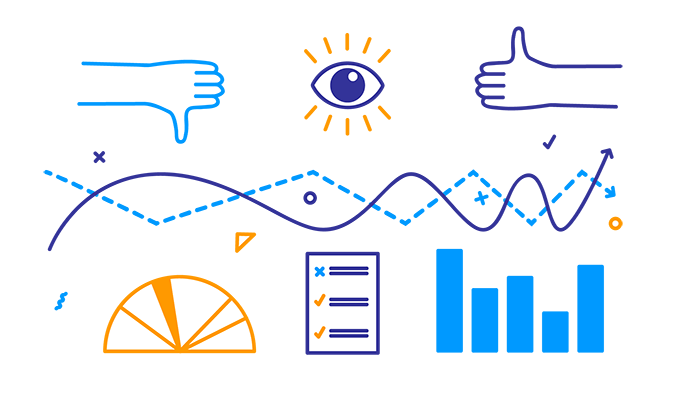
I call to perform a management to a call center. The person with whom I speak warns me that, at the end of the call, I will receive another to assess how I have been treated.
When finishing any menu in a restaurant, the waiter, with kindness, asks me if everything went well. Then, he suggests that I rate and comment on the quality of the restaurant on Tripadvisor : “It’s very important for us”.
I make a routine purchase at El Corte Inglés, and at the moment of payment, a small screen appears with several evaluation smileys : I have to show my degree of satisfaction.
Before deciding what to go to the cinema, some friends tell me that we will go to see such a film, because in filmaffinity it has an extraordinary score.
I choose an apartment on Airbnb based on the rating and comments of other guests. And at the same time, the owners of the apartments explicitly ask me to rate them great! because their future depends on it.
The pleasure of living in an evaluated world
All these everyday situations have something in common. It’s about the taste that we experience when we meet an evaluated world . And in the digital age, any anonymous person arrogates in turn the right to evaluate.
It’s nothing strange. Since childhood, the school system has accustomed us to give value to what is evaluated. The rest is a waste of time.
When asking any child, what about the school? The ordinary will be a simplifying answer: “Well, 3 outstanding and 4 notable”. What matters is the grade, the number that categorizes and judges us, but not the content of what is learned. And it happens that children learn to be people who adapt to the evaluation criteria. And nothing more.
You do not learn to learn, but you assume the methods to obtain a better evaluation. And it seems that what is not evaluated, does not exist.
Educational models such as Finnish are based on learning systems where school life is not a competition for maximum qualification. Does evaluation improve learning ?
In college it is no longer surprising that this behavioral model , whereby students only strive when there is a positive evaluation, is the norm.
It is also the norm for teachers . Doing something gratuitously, without academic prize, becomes a beautiful exception to the pragmatism of the evaluable.
Evaluating and being evaluated becomes a spiral that makes us depend on social recognition. It transforms us into people who react to those evaluation criteria. And what is not evaluable, simply, is useless because we will not be measured by it .
It is what the French sociologist Angélique del Rey calls “tyranny of evaluation”: we become strategists to win in the game of evaluation.
Social reputation in all areas
But what happens in the educational world has spread to any field of human activity. The social reputation system quantifies and compares the quality of the workers , but also the personal and sentimental areas.
One chapter of the Black Mirror series , titled Falling Down , showed a world in which each person carries their own qualification. Everyone evaluates and is evaluated and, depending on that rating, we can access the promised bonuses for being a model citizen.
Although it looks like science fiction, it is a social credit system that is already being developed in some cities in China. Based on the exemplarity and good citizenship of the inhabitants, a digital label is placed with their assessment.
We are a valued product and we will have to sell well in the market of mutual evaluations. We will act as good citizens, not because we want a better city, but because it will affect our qualification.
We love to evaluate because we feel we have the power to discriminate the good from the bad. Because we subject others to our judgments, to our criteria, even if we are not in a position to judge anything.
And we like to be evaluated because in that way we are not forgotten: we feel that we exist when being the object of the judgment of other human beings. We like to convert others into numbers. And also be ourselves numbers to measure our social success .
This is what happens with the obsession to accumulate more and more “I like” on Facebook . Or more retweets on Twitter . Or more followers in any other social network, like Instagram or Snapchat . It is our particular gloriometer , which measures and evaluates our social acceptance. As the Peeple app does on smartphones .
Evaluate is also hierarchical and enter the logic of the rankings . We all seem to live in a talent TV contest : compete for the medal! There will be a few winners and many other losers. Talent is useless if it is not certified.
What note does this article deserve? It will be given by the clicks that I attract. The practice called clickbait will make, for example, that to get more attention on the Internet, I have to write in a more sensational way. If the evaluation criteria are spectacular, I’ll have to fold them to make this article viral. Maybe not.
In his work on The Art of Being Happy , Arthur Schopenhauer pointed to what one represents for others as a cause of unhappiness.
“It is almost inexplicable how much joy all people feel whenever they perceive signs of favorable opinion from others who flatter their vanity in some way.”
And yet, we seek to become vain and fall into “the sad slavery of the opinion of others.” Or it is a requirement of a social system that rewards the adaptation to the evaluation criteria. And banishes everything that is not evaluable to the margins. It is the social Darwinism of evaluation.
Author Bio: Antonio Fernández Vicente has a PhD in communication philosophy from the University of Castilla-La Mancha
